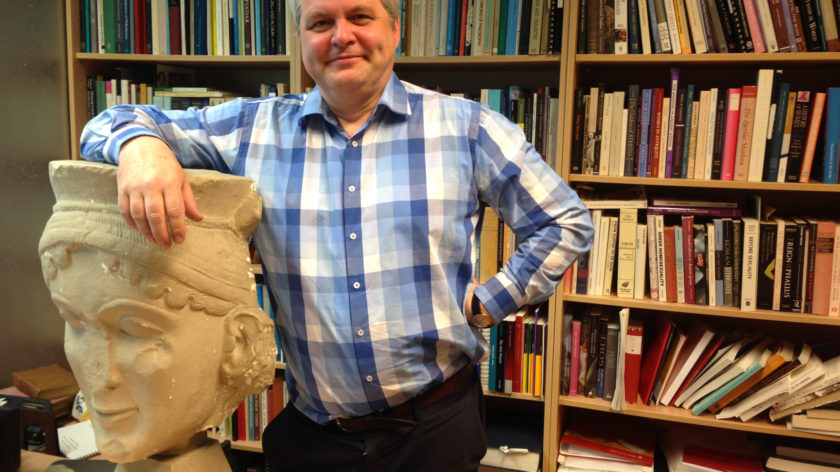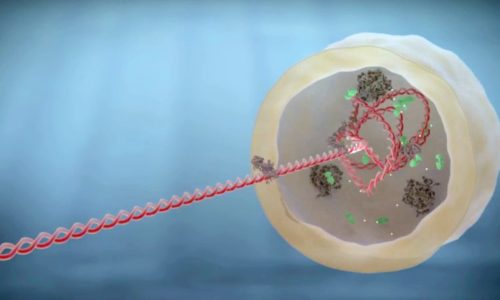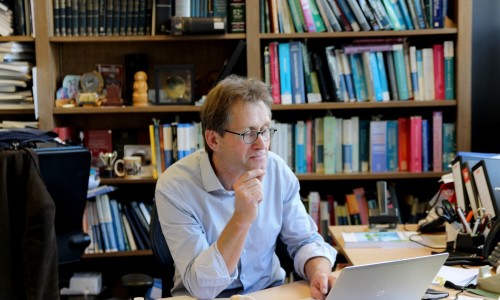Classicists finally receive million grant
-
 André Lardinois. Foto: Vox
André Lardinois. Foto: Vox
The research group of André Lardinois missed their target two times, but the third time’s a charm. Their research on the classical antiquity will get extra funding from the so-called 'Gravitation Grant' of NWO, the largest research grant in the Netherlands. Earlier, professor André Lardinois criticised the preferential treatment of science studies in acquiring research grants.
For the first time since the granting of the Gravitation Grant, in 2012, a humanities consortium received the grant. The National Research School in Classical Studies in the Netherlands, of which the Radboud University is secretary, receives 18.8 million euros for their research project ‘Anchoring Innovation’.
‘The minister urged to be more serious about these programs’
‘It was a lengthy process’, says André Lardinois, professor Greek and Latin Languages and Culture. ‘The previous two times we also made it to the last round, but eventually all the grants went to science studies or medical sciences.’ This year, for the first time, a humanities project and a combination of an humanities and social studies project have been honoured. Moreover, in the first Gravitation round, a project with the participation of language scientists has been honoured. (See Gravitation frame)
Lardinois points out that the minister herself was pleased with the fact that the grant went to a humanities project this week. ‘She already urged NWO to be more serious about these programs.’ Submitting a proposal is not easy: each university can submit up to four proposals. ‘We are very grateful that the board of directors of Radboud University was willing to submit our proposal three times in a row, often out of many good proposals.’
[kader-xl]
Three rounds of Gravitation
Since the first round in 2012, 18 research projects are honoured with a Gravitation Grant. With 15 grants, science studies and medical sciences are over-represented. Radboud University is the leader in 4 projects.
#2012: 176 million euros
3 science studies (Delft, Amsterdam, Nijmegen)
1 medical studies (Utrecht)
1 social sciences (Nijmegen)
1 social/medical sciences (Utrecht)
#2013: 153 million euros
4 science studies (2x Utrecht, Amsterdam, Eindhoven)
2 medical sciences (Leiden, Nijmegen)
#2017: 112,8 million euros
2 science studies (Leiden, Delft)
2 medical studies (Leiden, Eindhoven)
1 humanities/social sciences
1 humanities (Nijmegen)
[/kader-xl]
According to Lardinois, this grant underlines the meaning this university attaches to humanities. The importance goes far beyond the many young researchers who can now get involved in the project. ‘Nijmegen also confirms its rich tradition of antiquity studies. It shows that in the Netherlands, but also internationally, we are the place to go when you want to study antiquity.’
Nijmegen initiative
When in the second round all six Gravitation grants (153 million euros in total) went to science studies and medical sciences, the University board in Nijmegen came into action: OIKOS received three million euros to start the programme that has now been granted. With the help of the start-up grant, we could show what we are capable of, says Lardinois, who thanks to the grant, can continue the research for ten years. ‘During those ten years we don’t have to write any proposals, but we can concentrate on appointing and supervising people and on doing research.’
Focus point in the research are the innovation processes in antiquity. Lardinois: ‘When you hear innovation, you likely think of technology and modernity, which seems to contradict with antiquity.’ But the Classicists look at innovation from a different perspective: they study innovation in areas such as religion, politics and literature. ‘One of the questions we ask ourselves is whether innovation in those domains is different from innovation in technology.’ The researchers noticed that successful innovations are not just new, but also catch up with what’s old and familiar. This increases the acceptance of an innovation, explains Lardinois. ‘That’s what we call anchoring.’
The secret of innovation
The team’s research shows that one must anchor an invention to make it a success. ‘People are curious, but also conservative. It is this tension we need to overcome.’ As an example, he names the first electric cars, with the charging plug exactly in place of the fuel tip. ‘That plug could have been placed anywhere in the car, but it helped to convince that it is a real car, making the invention acceptable.’
‘We see ourselves as a piece of the puzzle’
An innovation can miss its mark if the people behind it forget the human dimension, Lardinois illustrates this with the introduction of the vaccine against cervical cancer. ‘A fine invention, but it was not accepted because it did not take into account how people deal with it. The researchers did not succeed to sell it to the group who was in need of this vaccine.’ The emphasis on the ‘human factor’ is exactly what humanities can contribute to innovation, states Lardinois.
Research in the field of anchorage also sheds a better light on how people are being manipulated. As an example, Lardinois names the Technasium, a gymnasium counterpart, taking part of that name to expose reliability. Much more dangerous, Lardinois names the way in which extreme right-wing groups in Europe and the United States use ancient symbols to legitimize their ideas, as did Hitler and Mussolini in the middle of the last century.
Example for the humanities
Lardinois does not want to claim that only classicist have the right view on innovation. According to him, it is necessary to get all scientific disciplines around the table in order to understand the phenomenon. ‘We see ourselves as a piece of the puzzle.’ The proof that ‘we can compete at the highest level for a grant’ can also be an incentive for other humanities scientists. ‘They do proper research, but mostly individually.’
Lardinois calls the classicists united in OIKOS, ’the microcosm of humanities’, with contributions from philologists, ancient historians, philosophers, art historians and archaeologists. ‘They all have their own approach.’ He hopes that this covenant will encourage other humanities scientists to run similar projects. ‘It’s also the only way to receive grants of this proportion. For an individual researcher or even one faculty, it’s really impossible.’ Therefore, according to Lardinois, it would be good if humanities scholars shift the boundaries even further by cooperating with completely different disciplines. He points to the now honoured project aimed at building a living cell that can divide itself. ‘Radboud philosopher Hub Zwart is involved, by studying the ethical aspects.’
To museums and schools
Besides for research, part of the money will also be used to convey the results to the general public: there will be exhibitions at the Valkhof Museum, the National Museum of Antiquities in Leiden and in the Allard Pierson Museum in Amsterdam. In addition, a number of teachers will be appointed as PhD students who, next to teaching, will work on a dissertation a couple of days a week. ‘We hope to demonstrate the usefulness of studying classical languages and culture to secondary schools, and we hope to show that even when it comes to such a modern phenomenon as innovation you can still learn from the Greeks and Romans.’




Nancy Felson schreef op 19 juni 2018 om 16:44
Congratulations, André, on receiving this prestigious and significant grant!
Such an innovative and societally useful initiative!
I’d love to tell you about the pedagogy, Reacting to the Past, which engages students in ethicial, political debates.
See you in Spetses!